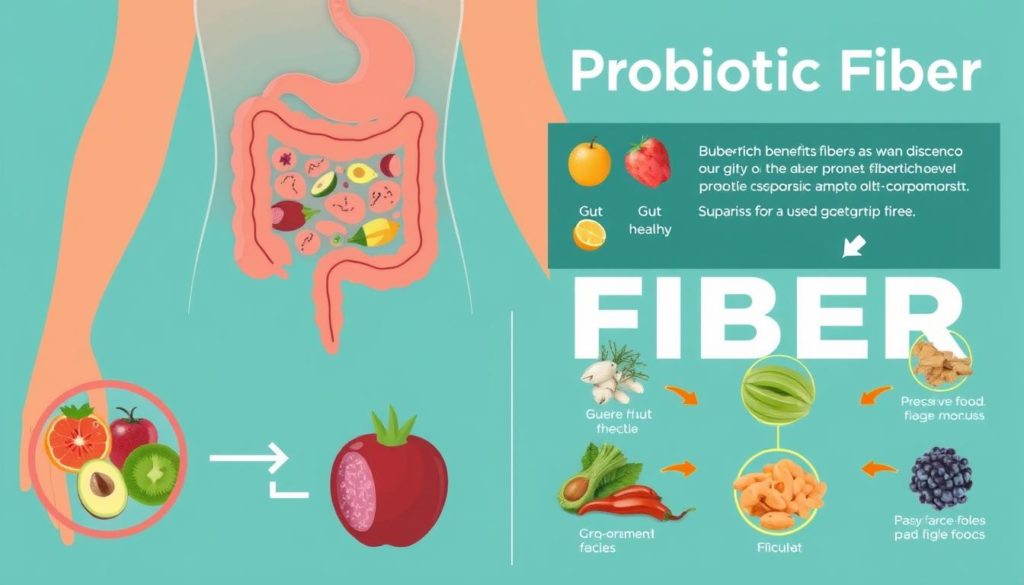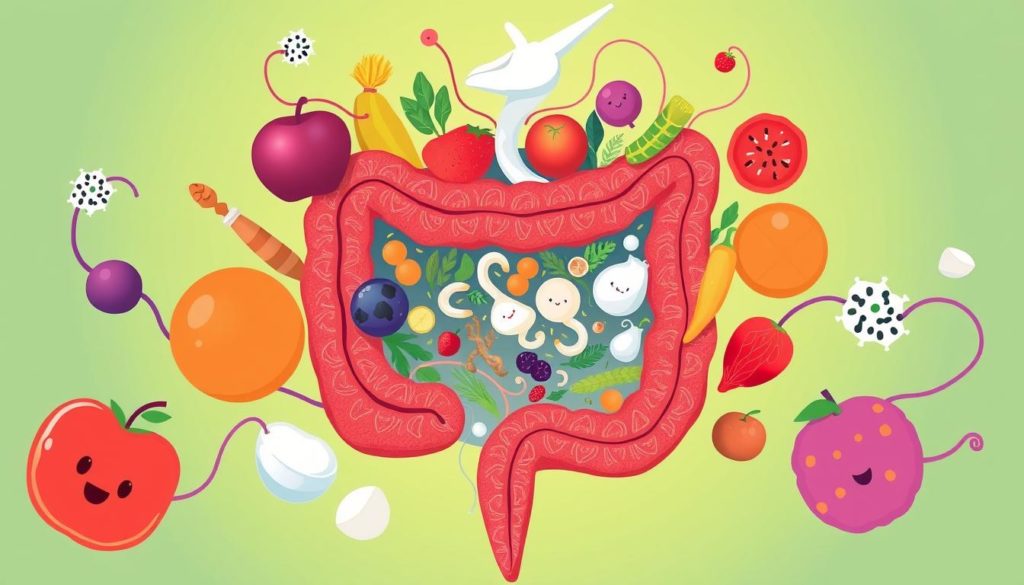Did you know that every year, over 60 million Americans struggle with digestive problems? This fact shines a light on the need for good, natural gut health solutions. Enter Probiotic Fiber—a new star in the world of dietary fiber and microbiome enhancement. It’s a natural choice for keeping our guts healthy, changing the way we think about gut wellness.
Probiotic Fiber is key in keeping a healthy balance in our gut. This balance is crucial not just for digestion, but for our overall health too. Learning about how this special dietary fiber works helps us understand its many benefits. It explains why it’s becoming an essential part of our diets.
Understanding Probiotic Fiber
Probiotic fiber is a special type of dietary fiber. It’s important for gut health and overall wellness. Unlike common fibers that help with digestion, probiotic fibers feed the good bacteria in the gut.

What is Probiotic Fiber?
Often called prebiotic fiber, probiotic fiber is a kind of dietary fiber that’s good for the gut. It feeds the good bacteria in the gut. This keeps the gut flora balanced, which is key for digestion and immune health.
How Probiotic Fiber Differs from Regular Fiber
Understanding the difference between probiotic and regular fiber is key. Regular fiber helps with bowel movements. But probiotic fiber does more by supporting the microbiome. It feeds the good bacteria, helping the gut stay healthy.
| Feature | Probiotic Fiber | Regular Fiber |
|---|---|---|
| Function | Nourishes beneficial gut bacteria | Encourages regular bowel movements |
| Target | Supports microbiome health | Primarily impacts digestion |
| Health Benefits | Enhances immune function, improves gut flora balance | Relieves constipation, controls blood sugar levels |
The Importance of Gut Health
Gut health is key for both our bodies and minds. Often called the body’s “second brain,” our gut is home to trillions of tiny life forms. These play a big part in keeping us healthy.

The Role of Gut Flora
Gut flora is made up of good bacteria that help our digestion. They break down the food we eat, make important nutrients, and protect our gut walls. This shows why gut flora is crucial for fighting off infections and dealing with long-term illnesses.
Impact on Overall Well-being
A well-balanced gut flora does more than just help with digestion. These good bacteria talk to our immune system and control how it reacts. They also make chemicals that influence our mood and how we think.
Having a healthy gut means better mental health, less anxiety, and a stronger immune system. It shows how important our gut health is to our whole body’s well-being.
| Gut Health Component | Key Functions | Health Impact |
|---|---|---|
| Beneficial Bacteria | Breakdown of foods, nutrient production | Enhanced digestion, nutrient absorption |
| Gut Flora Significance | Maintaining gut lining integrity | Reduced infection risk, disease management |
| Overall Well-being | Interacting with immune system, neurotransmitter production | Improved mental health, immune function |
How Probiotic Fiber Enhances Digestive Health
Probiotic fiber is key for better digestive health. It boosts good bacteria in the gut. This leads to improved digestion and nutrient absorption.
Supporting Beneficial Bacteria
Adding probiotic fiber to your diet helps good bacteria thrive. These tiny organisms balance our gut health. Probiotic fiber keeps harmful bacteria away, making our digestive system healthier.
Improving Digestion and Absorption
Probiotic fiber does more than just boost bacteria. It also helps improve digestion. The fibers turn into short-chain fatty acids, helping the gut absorb nutrients better. Eating probiotic fiber regularly boosts vitamin and mineral absorption. This helps our bodies work their best.
Here’s a simple look at how probiotic fiber compares to regular fiber:
| Benefit | Probiotic Fiber | Regular Fiber |
|---|---|---|
| Supports Beneficial Bacteria | Yes | No |
| Digestion Improvement | High | Moderate |
| Nutrient Absorption | Enhanced | Standard |
Probiotic Fiber and the Microbiome
Probiotic fiber is key to nurturing our gut microbiome. Our gut is a thriving hub for trillions of microorganisms. This community plays a big role in our health. Probiotic fibers provide food for these good bacteria, keeping things balanced.
Balancing Gut Flora
It’s important to keep our gut flora balanced. Probiotic fibers help good bacteria grow, which keeps harmful ones in check. This balance aids in digestion and how well we absorb nutrients.
Boosting Immune Function
A balanced microbiome also boosts our immune system. Healthy gut flora improves our immune defenses. Thus, probiotic fiber helps make our immune systems stronger and more resilient.
Best Sources of Probiotic Fiber
Adding top Probiotic Fiber sources to your diet boosts your gut health. We’ll explore effective natural foods and supplements for your diet.
Natural Food Sources
Eating natural food sources is a great way to add probiotic fiber. Choose foods like:
- Bananas: They are not just high in fiber but also help good bacteria grow.
- Garlic: Acts as a natural prebiotic, enhancing probiotic growth in the gut.
- Onions: They are full of inulin, a fiber that feeds beneficial bacteria.
- Asparagus: It contains inulin, supporting your digestive system.
- Whole Grains: Foods like oats, barley, and quinoa are packed with fiber and prebiotics.
Probiotic Fiber Supplements
If you struggle to get enough fiber from food alone, fiber supplements are an excellent choice. Here are some you might find useful:
- Psyllium Husk: It’s very high in fiber, aiding with constipation and improving gut health.
- Inulin: A prebiotic fiber that boosts beneficial bacteria.
- Acacia Fiber: This soluble fiber promotes digestive health and helps manage blood sugar.
- Pectin: Found in apples and citrus, it enhances digestion and helps with nutrient uptake.
- Chicory Root: A top choice for increasing prebiotic intake.
By adding these Probiotic Fiber sources into your meals, you’ll support a healthier gut and better overall health.
Benefits of Incorporating Probiotic Fiber into Your Diet
Adding probiotic fiber to your diet brings many benefits that greatly improve your health. This kind of fiber is key for better digestion and getting more nutrients from food. Now, let’s look at how probiotic fiber makes your digestive system and overall health better.
Improved Digestive Function
One big benefit of probiotic fiber is better digestive function. It helps good bacteria grow in your gut. This keeps your gut healthy and helps you break down food properly. People who eat more probiotic fiber often feel less bloated, have regular bowel movements, and enjoy better digestive health.
Enhanced Nutrient Absorption
Probiotic fiber is also important for better nutrient absorption. A working digestive system absorbs vitamins and minerals more effectively. It ensures the gut lining is strong so your body gets more from what you eat. This leads to more energy and better health overall.
| Benefits | Probiotic Fiber Advantages |
|---|---|
| Improved Digestive Function | Supports beneficial bacteria growth, reduces bloating, enhances regularity |
| Enhanced Nutrient Absorption | Optimizes nutrient uptake, supports gut lining, boosts overall well-being |
In summary, adding probiotic fiber to your diet is clearly beneficial. It makes digestion better and helps your body absorb more nutrients. It’s important to eat foods with probiotic fiber every day. This will help your gut and improve your health in many ways.
Probiotic Fiber: Boost Your Gut Health Naturally
Embracing Probiotic Fiber is a fantastic way to enhance natural gut health. This essential dietary component is key to our digestive systems. It helps our digestion work smoothly and efficiently. Probiotic Fiber boosts the growth of good bacteria, improving our health.
The benefits of Probiotic Fiber are many. It helps keep a healthy microbiome. This is a mix of microbes important for our body. They help in absorbing nutrients and keeping our immune system strong.
Many people find that Probiotic Fiber improves their health. It not only boosts the microbiome but also brings many other benefits. This leads to a better approach to gut health.
Probiotic Fiber is becoming more popular because it’s linked to good gut health. You can get it from foods or supplements. Making it part of your diet can improve your health greatly.
We can add Probiotic Fiber to our diets in many ways. This will give our digestion and overall health a big boost. Let’s see how to include this nutrient in our everyday life.
In short, Probiotic Fiber is great for our gut health. It helps maintain a healthy digestive system. Adding it to your daily diet brings many health benefits.
Tips for Choosing the Right Fiber Supplement
Finding the right fiber supplement can be tricky with so many choices out there. Getting to know the details of fiber supplement choice is key for your digestive health.
Reading Labels
It’s important to read labels carefully when picking a fiber supplement. Search for ones that list every ingredient. Pay attention to whether it’s soluble or insoluble fiber, and look out for any added ingredients. For a helpful guide, visit this resource on fiber supplements.
Consultation with Healthcare Providers
Talking to a healthcare provider before picking a supplement is a smart move. They can offer advice that fits your personal health needs. This way, your choice in fiber supplement is not only more effective but also safer.
Common Myths About Probiotic Fiber
There are many myths about probiotic fiber. Some people think it’s the same as regular fiber, but they’re different. Knowing the difference is key for good gut health.
“One common myth is that all fibers have probiotic properties, which isn’t accurate. Probiotic fibers, also known as prebiotics, specifically nourish beneficial gut bacteria, unlike regular dietary fibers.”
Another myth is that probiotic supplements are all you need for gut health. But, eating foods rich in natural probiotic fibers, like chicory root and garlic, helps even more. This can make a big difference in how well your digestive system works.
Some believe if probiotic fibers don’t work fast, they’re not working at all. Real improvement in gut health takes time, often weeks or months with regular intake.
It’s wrong to think that probiotic fibers can replace a balanced diet. They help, but you still need a mix of nutrients for your overall health.
Articles like this one shed light on these myths. They show how to keep your digestive health at its best with science-backed tips.
Learning the truth about these myths helps you make smart health choices. Always talk to a healthcare professional before starting new supplements. This ensures you get advice that’s right for you.
| Myth | Fact |
|---|---|
| All fibers have probiotic properties. | Probiotic fibers specifically nourish beneficial gut bacteria. |
| Probiotic supplements alone are sufficient. | A balanced diet rich in natural probiotic fibers is more effective. |
| Immediate results are a must. | Sustainable improvements take several weeks to notice. |
| Replacing a balanced diet with probiotic fibers is okay. | Probiotic fibers are most effective when complemented with a variety of nutrients. |
By debunking probiotic fiber myths and understanding the genuine health benefits, individuals can make healthier dietary decisions.
How to Include Probiotic Fiber in Your Daily Routine
Adding probiotic fiber to your daily meals can seem hard at first. However, with some planning and creative thinking, it gets easier. Start with small, easy-to-manage amounts of foods rich in fiber. Make sure to include them in all your meals throughout the day. This method does not just make it easier to add probiotic fiber to your diet. It also keeps your gut healthy.
Meal Planning
Planning your meals is crucial for easy addition of probiotic fiber to your diet. First, find out which foods are full of probiotic fiber, like bananas, apples, oats, and seeds such as chia and flax. Then, plan your weekly meals to include these foods in breakfast, lunch, and dinner. You could have a smoothie with chia seeds and banana for breakfast, an apple for a mid-morning snack, and a lunch salad with oats. By doing so, you ensure you’re getting enough probiotic fiber every day without hassle.
Recipes Rich in Probiotic Fiber
Exploring recipes that are high in fiber can also be fun. Why not try making a quinoa and veggie stir-fry for dinner? Or bake some oatmeal cookies with flaxseeds for a treat. These meals boost your daily intake of fiber. They also add variety to your diet, making it exciting and healthy. By trying out such recipes, you can easily and enjoyably add probiotic fiber to your meals.
FAQ
What is Probiotic Fiber?
Probiotic Fiber is a dietary fiber that feeds good bacteria in your gut. It’s key for a healthy microbiome and digestive health.
How does Probiotic Fiber differ from regular fiber?
Probiotic Fiber isn’t just for digestion. It acts as a prebiotic, nourishing good bacteria. This supports your gut’s health differently than regular fiber.
Why is gut flora important for overall well-being?
Gut flora, your gut’s microorganisms, is vital for health. It aids digestion, boosts immunity, and can even affect your mood.
How does Probiotic Fiber enhance digestive health?
By supporting good bacteria, Probiotic Fiber boosts digestion and the absorption of nutrients. So, it improves your digestive health overall.
Can Probiotic Fiber boost immune function?
Yes. Probiotic Fiber balances your gut flora, which is essential for a strong immune system. A balanced microbiome boosts immunity.
What are some natural food sources of Probiotic Fiber?
Foods like bananas, asparagus, garlic, and oats are great sources of Probiotic Fiber. They help feed your good bacteria.
Are there Probiotic Fiber supplements available?
Yes, various supplements offer Probiotic Fiber for those looking to boost their intake. Always check labels and talk to a healthcare provider before starting any supplement.
What are the benefits of incorporating Probiotic Fiber into your diet?
Adding Probiotic Fiber to your diet improves digestion, enhances nutrient absorption, and boosts gut health. It’s a game-changer for your diet.
Any tips for choosing the right Fiber supplement?
Choose a Probiotic Fiber supplement by reading labels and consulting healthcare providers. This ensures it fits your health needs.
What are some common myths about Probiotic Fiber?
Some people think all fibers are the same and supplements aren’t needed with a healthy diet. But Probiotic Fiber has unique benefits that regular fiber doesn’t offer. Supplements can be necessary for optimal dietary fiber.
How can I include Probiotic Fiber in my daily routine?
Add Probiotic Fiber by eating prebiotic-rich foods and using recipes with it. This ensures you consistently get its gut health benefits.


